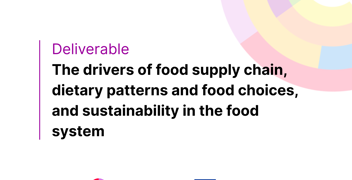A three-paper Lancet Series on ultra-processed foods (UPFs) and human health, published on 18 November 2025, provides a comprehensive and timely assessment of the global impact of an unhealthy diet, one of our greatest public health challenges. The papers also highlight constructive and sound measures to reduce the consumption of unhealthy foods.
The analysis relies on the Nova classification system, first presented in 2009 by Carlos Monteiro. This defines ultra-processed foods as "branded, commercial formulations made from cheap ingredients extracted or derived from whole foods, combined with additives" that compete with less processed and fresh foods. What demarcates ultra-processed foods from "merely" processed foods, is the presence of one or more predominantly industrial substances, such as modified starches, flavour enhancers or non-sugar sweeteners, on its ingredient list. Thus, ultra-processed foods are essentially identified by their formulations, not their inherent health effects.
Nevertheless, dietary patterns characterized by a high share of ultra-processed foods are higher in several nutrients of concern, including saturated fats, sodium, and free sugars. They are concomitantly lower in micronutrients, protein, and dietary fiber. By their nature, such diets displace nutrient-rich staples such as whole grains, fruits, and vegetables. Consequently, systematic reviews of large observational studies have consistently associated high ultra-processed food consumption with a number of chronic diseases as well as all-cause mortality.
An important physical characteristic of ultra-processed foods in general is their higher energy density compared to less processed counterparts. High energy density is known to be one of the most important factors that can cause excessive energy intake. Well-controlled randomized controlled trials have indeed found that a diet composed predominantly of ultra-processed foods can increase energy intake, often attributed to this energy density. A further characteristic that likely plays a role is the high sensory appeal ("hyper-palatability") of ultra-processed foods, through their precise combinations of fats, sugars, and salt.
A call for regulatory action
A key message from these papers is the necessity of moving the debate beyond individual dietary choice, to the political and economic forces that benefit from, and shape, the unhealthy food environment.
To drive this systemic shift, the reports put forward a comprehensive set of regulatory measures targeting both products, the food environment, and the food system. Policy recommendations include strengthening fiscal policies, with excise taxes on high fat, sugar, and salt (HFSS) foods and certain ultra-processed foods, front-of-pack warning labels, and marketing restrictions on HFSS products and ultra-processed foods aimed particularly at children. On the systemic level, the papers also call for using anti-trust laws and monitoring corporate political activities (CPA) to restrict the influence of large food corporations on health policy.
These core arguments strongly align with a recent report the JA PreventNCD project, specifically Task 9.4.1, Health and health equity impacts of policies. The report, The drivers of food supply chain, dietary patterns and food choices, and sustainability in the food system, examines the systemic drivers of unhealthy diets and emphasizes the necessity of high-level policy intervention that targets both the economic, regulatory, agricultural, and social systems that shape our food environment. As the JA report argues, the "rise of cheap, energy-dense, hyper-palatable ultra-processed foods (UPFs) high in added sugars, fats, and salt is both a symptom and a cause of modern food system failures".
The Lancet Series also identifies the power and influence of the corporate food regime as a major, structural barrier to public health progress. Food industry actors actively engage in CPA to prevent the development and implementation of effective nutritional policies, such as taxation or marketing restrictions. One of the aims of Task 9.4. in JA PreventNCD is to examine tactics used by the food industry, such as lobbying and constituency building, to influence policy in four European countries. Together with the new Lancet Series papers, this is a timely reminder that policy measures must be implemented with strategies to counter these documented political tactics that profit corporate interests over public health.
Moving forward
While the Lancet Series present a compelling case for systemic intervention, the current characterization of ultra-processed foods according to the Nova system remains a subject of scientific debate. Since the ultra-processed food category encompass a wide range of products with different ingredients, nutrient profiles, processing methods, it has been criticized for being scientifically ambiguous and subjective. A legitimate concern is that bundling together heterogenous foods with potentially opposing health effects (e.g., soft drinks and whole-grain wraps) creates a problematic target for public health policy. Another much-discussed issue is whether the classification adds to established food characterizations and official dietary recommendations. The Lancet Series authors acknowledge this complexity and note that stratifying ultra-processed foods by nutrient profiles and making subgroup-specific recommendations may be necessary, and that its "use in food regulation requires nuance".
As noted in a comment by Luz Maria De-Regil et al., the WHO is developing a more objective and operational definition of ultra-processed foods, and will provide evidence-based guidelines on ultra-processed food consumption. We welcome this effort, to ensure scientifically robust and effective policy interventions.
Author: Erik Arnesen, PhD. Erik works as a Senior Advisor at the Directorate of Health in Norway and is the task leader in the work on Health-enhancing environments (task 9.4) in the JA PreventNCD

